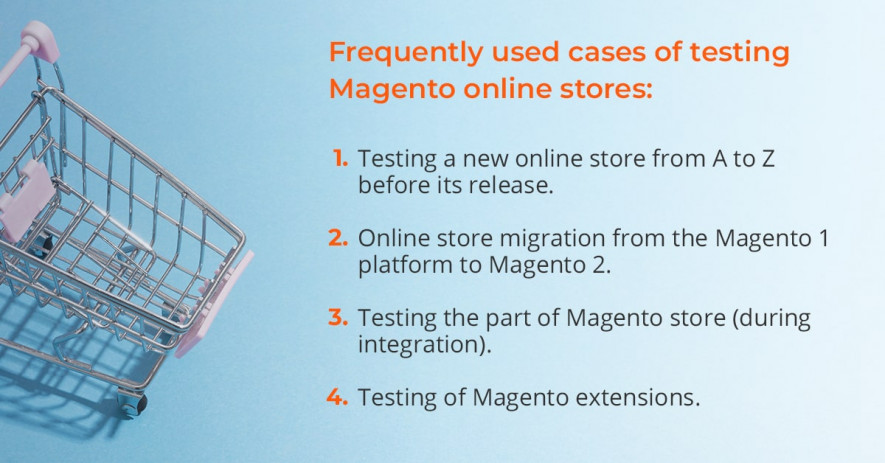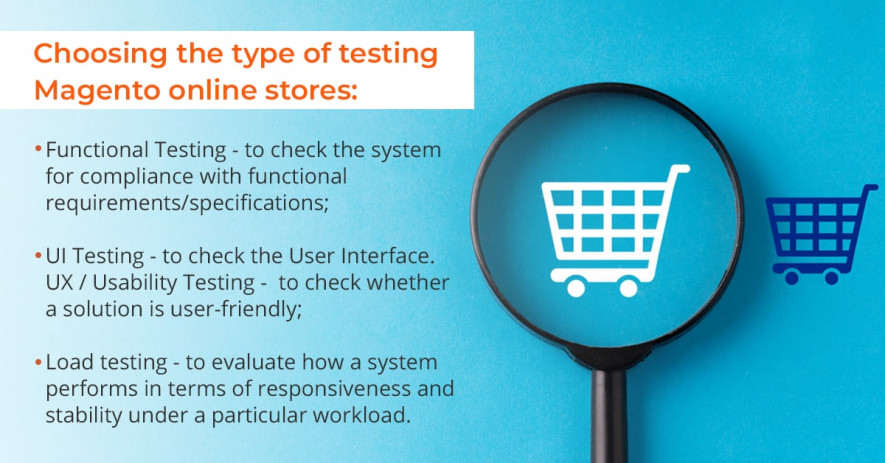- QATestLab Blog >
- QA for Business >
- Magento Testing: How to Ensure Positive Shopping Experience
Magento Testing: How to Ensure Positive Shopping Experience

Note: The article was updated in December 2020.
The number of Magento-based online stores is growing rapidly, but not each of them manages to stay competitive on the market and create a favorable user experience. What is the secret behind a positive shopping experience? Let’s find out right away.
How to Win Customers’ Hearts, or When Magento Testing Is Done Right
The number of online businesses powered by Magento is growing, and growing fast. However, it does not mean that there is no room for a new online store that can bring something new and improved to this market. If you want to create an effective and convenient online store or boost the existing one, software testing can be the key to success. But how to conduct Magento testing correctly and win your customers’ hearts?
Here are some of the cases when Magento stores should get tested:
- Testing a new online store from A to Z before its release. It is the case when online stores can be already released for a long time but the testing has not been carried out and store owners want to check the quality of their store.
- Online store migration from the Magento 1 platform to Magento. Store owners commonly engage the software testing team in order to verify that all the data qualitatively migrated to another version and that all the technical features that used to be in the store operate correctly on the second version.
- Testing the part of Magento store (during integration). This is testing of the integration process of Magento stores data with third-party data storage and processing systems like CRM, ERP. Often the stock updates all the information inside their system, but then all this data should be correctly integrated into the Magento admin panel and displayed correctly on the website. Usually, in such cases, QA engineers apply integration, API, and security testing.
- Testing of Magento extensions. If a client wants additional promotions, push alerts, filters, etc. for their store, it is possible to purchase a ready-made extension – so there is no need to ask the developers to create it from scratch. That is why some companies create such extensions by uploading them to the Magento marketplace. To be accepted, it must also be of appropriate quality, and therefore, a testing team is also involved.
As you can see, there a variety of cases when Magento software testing and quality assurance are required.
Step-by-step guide on testing Magento-powered stores
After the stage of setting goals for testing between QA engineers and product owners completed, there can be several options for testing. Over the years, our company has gathered many scenarios and methodologies on how to test a particular product.
Option when there is (no) technical documentation
The client can provide the QA team with all requirements needed or prepared test scenarios. There is also an option when the QA team can prepare all testing documentation for a client. The client decides whether they need test scripts, checklists, or any kind of test documentation on the test results in order to use it in the future or provide it to another tester team.
What if the client doesn’t provide any documentation?
It is the most common option when the client does not have any test documentation. Using the Adhoc method, QA engineers test the product on the basis of their knowledge, experience of testing similar products, they recognize the system and the logic of such a store and actually conduct testing.
Choosing the testing type (Functional, UI testing, Usability, Load testing, etc.)
The tricky thing is that Magento has a lot of its own peculiarities that you need to know in order to accurately and efficiently test it, it is extremely difficult to perform testing for Magento online stores using Adhoc testing only. It is not enough.
To the greatest extent, the success of Magento testing depends on choosing the right type of testing. Of course, there are many options that you can opt for, as well as combine several at once. But to get the most effective results from testing, you need to know information about each of them.
Functional testing
Functional testing is needed to check the functionality of the site – whether everything works correctly, everything is clicked, switched, added, etc. In such cases, while testing the Magento store, QA engineers go through the usual default user flow and focus on places where some custom functionality was added, wherever the default development of the Magento changed, that is, the client wanted to redo the functionality for themselves: for example, adding new buttons, new fields, new logic
User interface testing
UI testing aims to check the site’s adaptability to mobile platforms, cross-browser checking so that no browser features affect the site’s performance. For example, sometimes it happens that in Internet Explorer it is not possible to click any buttons. It happens that on a PC the site looks good and everything works, but on mobile devices, everything crashes and breaks, and it becomes not usable. Plus, mobile adaptability is very important.
Sometimes functional and UI testing will not be enough. That’s why there are several types of testing for Magento that are optional but useful and performed at the request of the client:
Usability testing
A user-friendly website is key to optimizing an e-commerce store and increasing the conversion rate. Usability testing helps find out whether visitors are satisfied with the overall user experience and able to easily find the information and products they need. It also identifies errors occurring for the users.
Load testing
The next one is load testing – if the store owner expects that in the future the store will develop and customer’s flow will arrive on the site, because of some promo campaigns or especially if it’s some kind of seasonal sales, holidays, Black Friday. To prevent the site from falling you need to conduct load testing and analyze how many users can be on the site at the same time.
Final Word: What’s the most important thing in testing Magento?
To sum it up, Magento testing is a complex task requiring not only robust QA expertise but also background on Magneto itself. QA engineers who are familiar with the platform, work more efficiently, much faster, they have no questions on the logic of working with Magento. Therefore, you can engage a team of testers so that they check where in your e-store is the bottleneck in the sales funnel, where it happens so that the customer falls off, where is the problem.
……………………………
If your products are requiring testing, we are ready to hedge your team and ensure high quality. We are participating in the life of the product, and do our work with a passion for your success. Contact us to learn more about QA & testing.
Let’s make great products together!
Learn more from QATestLab
Related Posts:
- How to make users add your online shop to bookmarks?
- How to Improve E-Commerce Products?
- The Power of Automated QA in E-Commerce: Speed, Stability, and Success
About Article Author
view more articles
has more than 2-year experience in blogging and copywriting, copyediting and proofreading of web content.
View More Articles








No Comments Yet!
You can be the one to start a conversation.